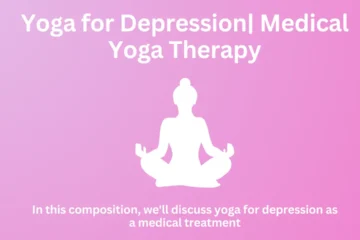As a yoga beginner, I also don’t know the difference between a yoga teacher and a yoga therapist. Finally, I know what the main difference is between a yoga therapist and a yoga teacher. Let’s know what is the main difference between the therapist and the teacher. So, let’s clarify the difference between the therapist and the teacher in this yoga blog post. To put it briefly, a yoga therapist consults privately with a client, applying yoga practices to specific health concerns, whereas a yoga teacher or instructor can guide students in doing yoga in a class.
Still unclear? In search of further details? Being a qualified yoga instructor and yoga therapist, I am well-versed in the differences between these two fields of work and the prevalent misconceptions surrounding them. Learn more about yoga instructors vs. yoga therapists by reading on, whether you want to become a client or pursue a profession in yoga yourself.
Yoga Therapist Vs Teacher
Yoga has gained popularity all around the world because of its many internal, external, and spiritual health advantages. The diversity within the yoga community is expanding along with the popularity of the practice. Yoga preceptors and yoga therapists are two familiar faces in the yoga world. Despite their apparent similarities, the two are very different in terms of training, practicing standards, and aspirations. Let us go more into these distinctions to have a thorough comprehension.
1. Education and Training
Yoga Instructor
- A yoga instructor often completes an extensive training program that, depending on its complexity and intensity, can span anywhere from several months to several years.
- The main focus of these programs is on teaching students yoga asanas (postures), pranayama (breathing techniques), meditation, deconstruction, gospel, and teaching approaches.
- Programs for educating yoga teachers may range in how much emphasis is placed on various forms of yoga, such as Hatha, Vinyasa, Ashtanga, or Kundalini.
Yoga Therapist
- More technical training is required for yoga therapists than for yoga educators. They typically comprehend the deconstruction, physiology, psychology, and therapeutic applications of yoga on a greater level.
- Assessment skills, remedial relationship structure, yoga for particular groups or situations, and adaptations for individual needs are common themes in their training.
- Programs that teach yoga remedies may require students to complete a set amount of study hours, a supervised internship, and occasionally even clinical practice.
2. Compass of Practice
Yoga School Teacher
- A yoga teacher’s main responsibility is to lead students through yoga lessons, emphasizing physical postures, breathwork, and relaxation techniques.
- They could provide private sessions or instruct group programs at community centers, fitness facilities, and yoga studios.
- Yoga preceptors’ main goal is to ensure that their learners have a safe and enjoyable yoga practice, even if they may offer basic advice on posture and modifications.
Yoga Instructor
- Yoga therapists use the practices of yoga to treat certain health issues, injuries, or ailments in individuals or small groups.
- They carry out in-depth evaluations to comprehend the client’s mental, physical, and internal health and, as a result, knitter yoga practices.
- Yoga therapists regularly collaborate with medical specialists to supplement traditional treatment regimens or provide essential methods for managing health problems.
- Aiming to perfect general well-being, their practice may encompass remedial yoga techniques, contemplation, mindfulness activities, and life advice.
3. Objects and Pretenses
Yoga School Teacher
- A yoga schoolteacher’s main responsibility is to mentor students in the practice of yoga for general well-being, physical fitness, and stress alleviation.
- Yoga preceptors may want to uplift and enable their students to cultivate a balanced yoga practice that improves their well-being.
Yoga Therapist
- By employing yoga as a therapeutic modality, yoga therapists seek to treat certain health concerns or issues.
- Their goals could include pain relief, stress management, inflexibility perfection, internal health enhancement, injury or illness recovery support, and the promotion of tone care and tone mindfulness.
- Yoga therapists collaborate with clients to create evidence-based yoga programs that are heartily and long-term healthy, as well as safe, efficient, and sustainable.
When to See a Yoga Therapist VS A School Teacher
You might be asking if it’s better to consult a yoga therapist or a yoga educator given these distinctions.
If you wish to learn how to practice yoga, particularly the asanas (yogic deeds),.
- You might want to seek out a yoga instructor.
- You wish to use yoga as a workout, fitness, or weight loss method.
- You would want to practice yoga with others.
- You wish to study a certain type of yoga, such as Yin Yoga or Hot Yoga (which includes Power Yoga and Bikram Yoga, among others).

Seeking a yoga therapist might be beneficial if you wish to recover from a particular internal or physical ailment.
- You desire individualized care and reconciliation.
- You’ve attempted physical treatment, but it hasn’t entirely taken care of the problem.
- You need assistance with a persistent health concern.
- You’re seeking a trauma-informed strategy for healing.
The Distinction Between Training for Yoga Teachers and Yoga Therapists
To become a pukka, yoga therapists and preceptors must undergo training. Usually, this entails finishing a training course in a predetermined minimum number of hours. After that, provided they fulfill all other requirements, they can apply for an instrument. In cases where the instrument is sophisticated, this might entail spending a specific amount of time teaching yoga.
Yoga Alliance is the most common source of instruments for yoga preceptors, while the International Association of Yoga Therapists (IAYT) is the most common source for yoga therapists. Yoga therapists and preceptors are often lifelong learners.
In actuality, to maintain their pukka status, yoga therapists must earn a specific amount of continuing education credits. The most significant distinction between the training programs for yoga teachers and yoga therapists, apart from the content differences, is that the former has a far more advanced admission level. For more details on the differences between yoga therapist and schoolteacher training, continue reading.
Conclusion
Although they share a love of yoga and a desire to assist others, yoga preceptors and therapists are very different in terms of their training, practice scope, and self-perception. Yoga therapists use yoga as a corrective intervention to address particular health issues, whereas preceptors focus on teaching individual or group yoga programs.
Whether a person wants to strengthen their yoga practice or seek out remedial treatment for health and well-being, knowing these distinctions can help them pick the appropriate practitioner based on their needs and aspirations. If you ever feel confused or need guidance, reach out to us through our contact form. I wish you a fulfilling and perfect yoga experience ahead!



0 Comments